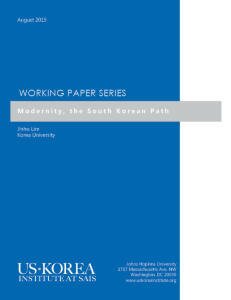ABSTRACT
 South Korea has experienced a ‘compressed capitalist development’ over the last five decades, characterized by unprecedented levels of industrialization and democratization with other distinctive features. The country’s unique experience with development has attracted the attention of many scholars who view the country as a site for new modernity, following after the Western prototype. However, controversy surrounds these claims about South Korea’s emerging modernity. Although some scholars argue that South Korea is now experiencing a Western type of modernity, others reject this assertion and argue that the country has not modernized at all.
South Korea has experienced a ‘compressed capitalist development’ over the last five decades, characterized by unprecedented levels of industrialization and democratization with other distinctive features. The country’s unique experience with development has attracted the attention of many scholars who view the country as a site for new modernity, following after the Western prototype. However, controversy surrounds these claims about South Korea’s emerging modernity. Although some scholars argue that South Korea is now experiencing a Western type of modernity, others reject this assertion and argue that the country has not modernized at all.
This paper attempts to investigate the dynamics and contradictions of capitalist development in Korea from a perspective of vertical modernization. It will consider the origin, process and outcomes of modernization, mainly in terms of democracy, economic growth and welfare. It argues that there are different sites and forms of modernity in the world, and that South Korea would be a good candidate to examine a non-Western modernity. It contends that the country’s modernity has been distorted and unbalanced in the development of society, culture, politics and economy. Historically, South Korea has gone through traditional unmodernity, colonial undermodernity and Western modernity. A clear examination of the country’s development experience reveals the complex nature of modernity in that tradition, as well as how modernity and postmodernity coexist with one another in the present time. It concludes that South Korean modernity is an incomplete project.
Download the USKI Working Paper, “Modernity, the South Korean Path,” by Jinho Lim (Korea University), August 2015.
Visit other papers in the USKI Working Paper Series.



